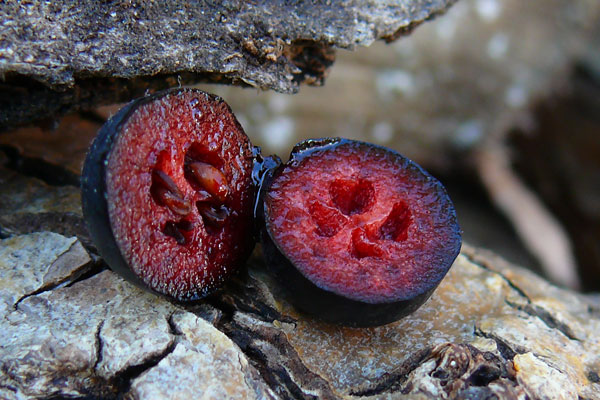This berry has it all! It trumps with a sensationally high content of antioxidants, which gives it incredible health potential. It can prevent or treat a wide range of diseases.
Where does the aronia berry come from?
The aronia berry (Aronia melanocarpa) originally grew wild in the USA, but has been planted in Europe, including Switzerland, for several years. The plant grows like a bush and can reach a height of two to three meters. It is extremely hardy and frugal and does not require any pesticides. What is really amazing, however, is the enormous health potential of these berries, which are rather inconspicuous in terms of appearance and taste!
superfood
The berries have long attracted the attention of complementary medicine because of their high content of polyphenols: flavanoids, proanthocyanins, carotenoids, vitamin C and many others. These secondary plant substances (also called micronutrients, vital substances or phytochemicals) have numerous positive effects on health, for example they reduce the risk of cancer and have a positive effect on the immune system.

polyphenols
The total content of polyphenols is 10-20 g/kg (University of Illinois study) and is thus far higher than that of raspberries, strawberries or blueberries. Polyphenols are only found in plants and are found in the outer layers of fruits and vegetables, but also in grain. In their chemical structure they show several aromatic rings (phenol). They have an antioxidant effect, they eliminate the so-called harmful free radicals in our body, which are partly responsible for numerous serious diseases and also promote the aging process. For this reason, the effects of polyphenols in the body are not limited to one organ, as with a drug, but these substances have several positive effects on different organs at the same time.
Over 200 studies have shown the link between eating more (organic) berries, fruits and vegetables and reducing cardiovascular disease and cancer. Some of these studies have been published in well-known medical journals and are still ignored by most doctors.
OPC, the most powerful known antioxidant

The main effect of the aronia berry is based on its high antioxidant content. There are many antioxidant substances in food, such as vitamins C and E, selenium and various polyphenols. The high OPC (oligomeric proanthocyanidin) content makes the aronia berry a health fruit with the highest potential and the highest ORAC value (measure of antioxidant capacity) ever measured.
What are antioxidants?
An antioxidant , also known as a free radical scavenger, can interrupt the chain reactions of free radicals and in this way prevent cell damage and thus diseases. Free radicals are oxygen-containing molecules that are dangerously unstable because they are missing an electron in their chemical structure. In the "search" for the missing electron, the free radicals are extremely aggressive. The required electron is simply "stolen" from the next best intact molecule in the body. This «electron stealing» is called oxidation. When the oxidation in the body cells exceeds a tolerable level, so-called oxidative stress occurs. The cells are damaged, which can lead to a wide variety of diseases. This is where the antioxidants come into play, because they "voluntarily" give up one of their electrons and thus protect the cells.
Ingredients of Aronia:

- 85% water
- 12% glucose and fructose
- All vitamins except B12 and D, mostly vitamin C and vitamin K
- folic acid
- 0.7% protein
- OPC (oligomeric proanthocyanidins)
- flavanoids
- carotenoids
- sodium
- potassium

- calcium
- magnesium
- sulfur
- iodine
- copper
- manganese
- zinc
- iron
Aronia has a preventive or curative effect on the following diseases:
- Cardiovascular: Arteriosclerosis, Heart Attack, Angina Pectoris, High Blood Pressure, Varicose Veins, Swollen Legs, High Cholestrin
- Joints: arthritis, gout, rheumatism
- Allergies: asthma, hay fever
- Brain: stroke, Alzheimer's, Parkinson's, depression, burnout
- Eyes: Glaucoma/cataracts, presbyopia
- Skin: Collagen build-up (skin firmer, fewer wrinkles), skin rashes (eczema, acne, allergies, etc.)
- Men: Improvement in prostate function
- Women: irregular periods, menstrual problems, menopausal symptoms
- Nervous system: lack of concentration, tiredness, forgetfulness
Even with extremely high doses of up to 20g Aronia extract per day in volunteers, there was not a single side effect! But it must be noted that the active ingredients can only be absorbed in the intestines if people eat a balanced, healthy diet with plenty of fiber.
Natural cortisone replacement
Aronia also serves as a natural cortisone substitute. Many of the polyphenols contained in aronia have an anti-inflammatory effect. Among other things, they weaken the effect of the two inflammatory factors COX1 and COX2. Cortisone also has an anti-inflammatory effect, but long-term use damages the lymphocytes (white blood cells). This is not the case with Aronia. Aronia has proved very effective in allergies, but also in chronic inflammatory processes such as arthritis. Experience shows that the cortisone dose can often be at least halved in chronic inflammation.









